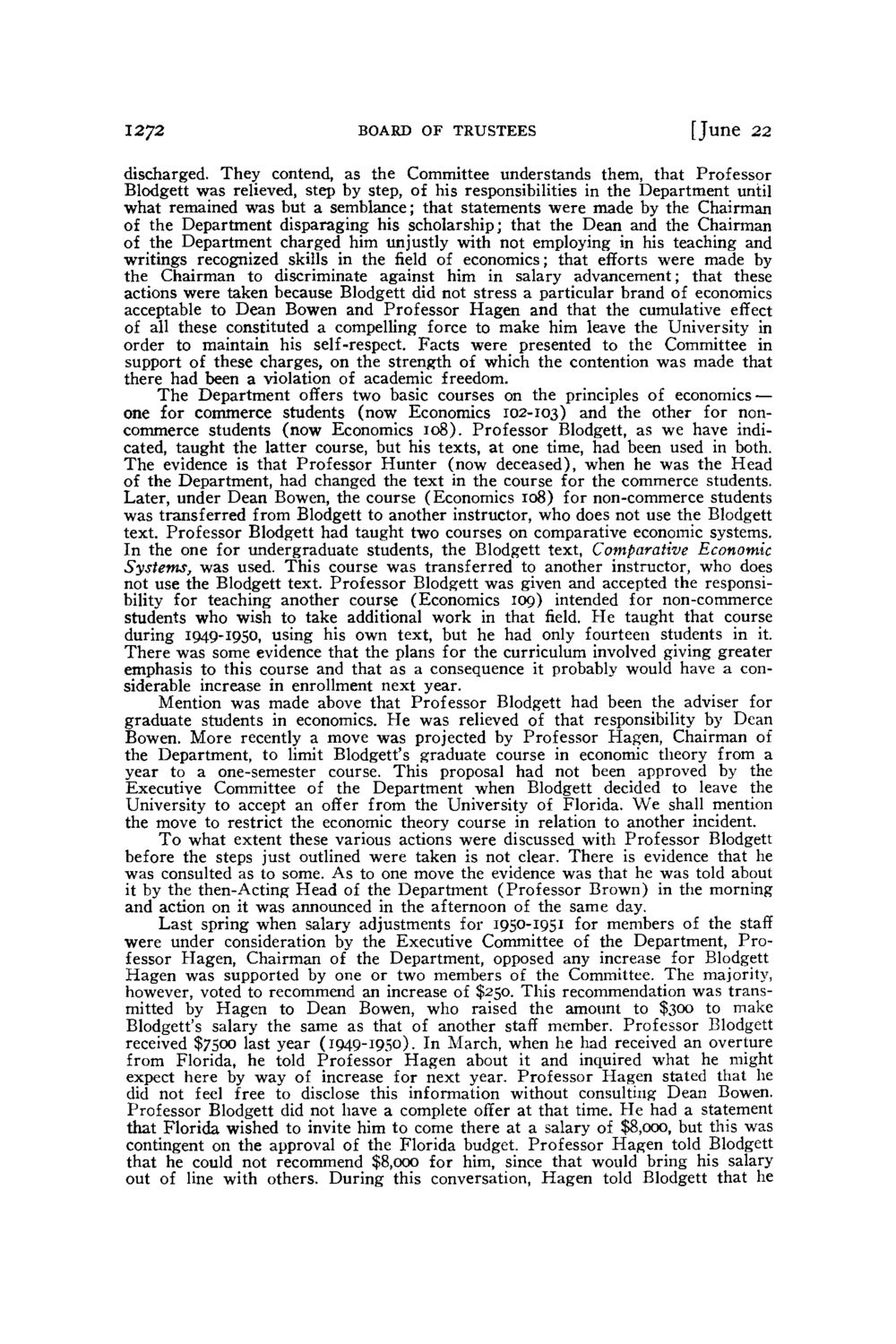| |
| |
Caption: Board of Trustees Minutes - 1950
This is a reduced-resolution page image for fast online browsing.

EXTRACTED TEXT FROM PAGE:
1272 BOARD OF TRUSTEES [June 22 discharged. They contend, as the Committee understands them, that Professor Blodgett was relieved, step by step, of his responsibilities in the Department until what remained was but a semblance; that statements were made by the Chairman of the Department disparaging his scholarship; that the Dean and the Chairman of the Department charged him unjustly with not employing in his teaching and writings recognized skills in the field of economics; that efforts were made by the Chairman to discriminate against him in salary advancement; that these actions were taken because Blodgett did not stress a particular brand of economics acceptable to Dean Bowen and Professor Hagen and that the cumulative effect of all these constituted a compelling force to make him leave the University in order to maintain his self-respect. Facts were presented to the Committee in support of these charges, on the strength of which the contention was made that there had been a violation of academic freedom. T h e Department offers two basic courses on the principles of economics — one for commerce students (now Economics 102-103) and the other for noncommerce students (now Economics 108). Professor Blodgett, as we have indicated, taught the latter course, but his texts, at one time, had been used in both. The evidence is that Professor Hunter (now deceased), when he was the Head of the Department, had changed the text in the course for the commerce students. Later, under Dean Bowen, the course (Economics 108) for non-commerce students was transferred from Blodgett to another instructor, who does not use the Blodgett text. Professor Blodgett had taught two courses on comparative economic systems. In the one for undergraduate students, the Blodgett text, Comparative Economic Systems, was used. This course was transferred to another instructor, who does not use the Blodgett text. Professor Blodgett was given and accepted the responsibility for teaching another course (Economics 109) intended for non-commerce students who wish to take additional work in that field. H e taught that course during 1049-1950, using his own text, but he had only fourteen students in it. There was some evidence that the plans for the curriculum involved giving greater emphasis to this course and that as a consequence it probably would have a considerable increase in enrollment next year. Mention was made above that Professor Blodgett had been the adviser for graduate students in economics. H e was relieved of that responsibility by Dean Bowen. More recently a move was projected by Professor Hagen, Chairman of the Department, to limit Blodgett's graduate course in economic theory from a year to a one-semester course. This proposal had not been approved by the Executive Committee of the Department when Blodgett decided to leave the University to accept an offer from the University of Florida. W e shall mention the move to restrict the economic theory course in relation to another incident. T o what extent these various actions were discussed with Professor Blodgett before the steps just outlined were taken is not clear. There is evidence that he was consulted as to some. As to one move the evidence was that he was told about it by the then-Acting Head of the Department (Professor Brown) in the morning and action on it was announced in the afternoon of the same day. Last spring when salary adjustments for 1950-1951 for members of the staff were under consideration by the Executive Committee of the Department, P r o fessor Hagen, Chairman of the Department, opposed any increase for Blodgett Hagen was supported by one or two members of the Committee. The majority, however, voted to recommend an increase of $250. This recommendation was transmitted by Hagen to Dean Bowen, who raised the amount to $300 to make Blodgett's salary the same as that of another staff member. Professor Blodgett received $7500 last year (1949-1950). In March, when he had received an overture from Florida, he told Professor Hagen about it and inquired what he might expect here by way of increase for next year. Professor Hagen stated that he did not feel free to disclose this information without consulting Dean Bowen. Professor Blodgett did not have a complete offer at that time. H e had a statement that Florida wished to invite him to come there at a salary of $8,000, but this was contingent on the approval of the Florida budget. Professor Hagen told Blodgett that he could not recommend $8,000 for him, since that would bring his salary out of line with others. During this conversation, Hagen told Blodgett that he
| |